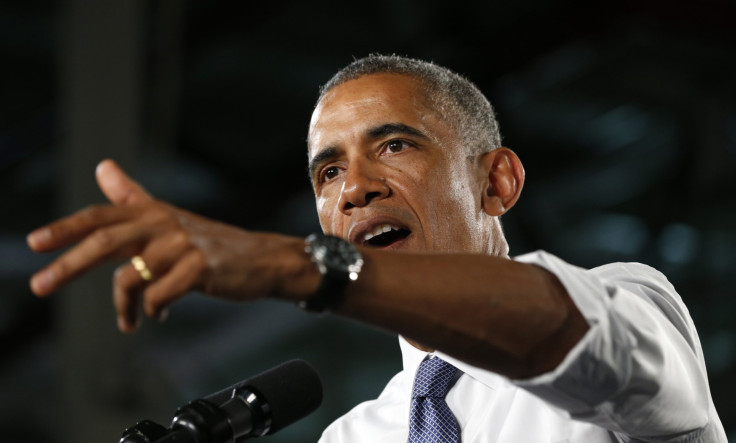Free Community College: Republicans Slam Obama's Proposal For High Cost, Low GPA Requirement

President Barack Obama's plan to give two free years of community college to U.S. students was criticized by conservatives Friday for its lack of details, potential high costs and minimum grade-point-average requirement. Obama was scheduled to detail Friday the plan unveiled Thursday night, but domestic policy adviser Cecilia Muñoz told reporters he had already accomplished his main goal: "to start a conversation" about increasing access to college.
House Speaker John Boehner was not impressed. "With no details or information on the cost, this seems more like a talking point than a plan," his spokesman Cory Fritz said in a statement. Some news outlets estimated the effort would cost roughly $15 billion a year.
Obama's plan would give two free years of community college to "everybody who is willing to work for it," Reuters reported. Students would have to be enrolled at least half-time and actively work toward completing their programs. They also have to maintain a 2.5 GPA -- a C+ average -- which critics of the plan said was too low.
The proposal could save up to 9 million students $3,800 in tuition a year, and the federal government would foot 75 percent of the bill. States would pay the other 25 percent, ABC News reported. That's what some critics were concerned about Friday morning.
The proposal is based on the Tennessee Promise, which gives Tennessee high school seniors two free years at any state community college or technical school. Rep. Diane Black, R-Tenn., supported the Tennessee Promise but expressed frustration about the president's potentially pricey plan. "While the White House says that three-quarters of the program would be paid for with federal funding, I have yet to hear what offsets, if any, would be proposed to ensure Americans are not saddled with greater debt and deficits as a result," she said in a statement. "Will the president offer proposals to make his plan budget-neutral, or will he attempt to charge it to the credit card? Ultimately, any efforts to reboot Tennessee Promise as a one-size-fits-all nationwide approach will be met with heavy skepticism from Congress."
The debate also unfolded on social media. While many Twitter users posted messages in support of the plan, some tweeted that it was unrealistic, expensive and enabled low-achieving students.
See examples below:
@DaveRamsey @beanera what's hilarious is that you MUST maintain a 2.5 GPA. 2.5?? A 'C' average?? A bit low don't ya think?
- Nathan Eckart (@Nathan_Eckart) January 9, 2015I don’t have a problem with #FreeCommunityCollege but a 2.5 GPA requirement is wayy to low!
— Aaron (@amkirk) January 9, 2015Apparently for the "Free" Community College, you need to maintain a gpa of 2.5. Those are ridiculously low standards for "free" education.
— GetLoudLambeau (@EBrooksUncut) January 9, 2015Obama proposes two years of free community college. Anyone else think a 2.5 GPA requirement is too low? http://t.co/oeDGMkIDXf via @reuters
— Karina Munoz (@la_anth) January 9, 2015@zarrykms 2.5 Gpa is not good grades. Just more low expectations of youth.
— Newsielady (@NewsieSc) January 9, 2015Tuition free Community College? Hmmm so who's paying then? I bet I know.
— Mark Whitmore (@TwistedWhitty) January 9, 2015the president wants to make 2 years of community college for free?! and who is going to pay this $34 BILLION dollar/year bill??
— Elaine Gordon (@egordon4) January 9, 2015@rolandsmartin I have served as a consultant & lecturer in higher education for 12 years. Universal free community college education? No
— JACQUELYN ROCHELL (@jacquelynrochel) January 9, 2015This idea of free community college is just another example of how this administration is trying to ruin this country.
— Phillip Edwards (@eddy_phillip) January 9, 2015This free community college proposal sounds rickety
— Patricia Parker (@WOMVN) January 9, 2015This "free" community college proposal will pave the way for Obama wanting this to extend to illegal aliens #tcot #immigration
— DavidJPotts (@DivineTurbine) January 9, 2015All this really does is extend high school by two more years. Wouldn't it be better if we ensured that every... http://t.co/xL3iomMLsm
— Ken Hansen (@n2vip) January 9, 2015Two free years of community college! In other words, two more years of adolescence!!!
— Monica Broccolo (@mobrolo) January 9, 2015Trillions in debt & the pres wants to add free community college to tax payers burden. Unreal.
— M Brophy (@Team_Brophy) January 9, 2015Free community college..ha!
— sandyhare (@elevatorsMG) January 9, 2015@morricles Free community college won't be "free" at all, but an expensive construct to Show "Obama Cares About You". Political pandering...
— DMIII (@DMIIICEO) January 9, 20152 years of community college free sounds great but let's hear the plan. Oh really high taxes so the government can waste more of our money.
— Pittsburgh Matt (@Pitt_Man33) January 9, 2015Great day for motel owners! They get to add "Free Community College" to their "Free HBO" signs.
— Pete Kinney (@petekinneypga) January 9, 2015Oh that's cute that obama thinks community college will be free
— Ryan Mccarthy (@Mr_CooterWang) January 9, 2015Free two year community college? Last time I checked there's not a damn thing for free!! Oh wait, that means higher taxes I'm sure.
— Jason Steele (@ajsteele30) January 9, 2015Obama's 'Free' Community College Plan Could Cost $34B Per Year http://t.co/YaDK4T9o9A How much you wanna bet this will run like #Obamacare?
— zebageba (@zebageba) January 9, 2015© Copyright IBTimes 2025. All rights reserved.






















